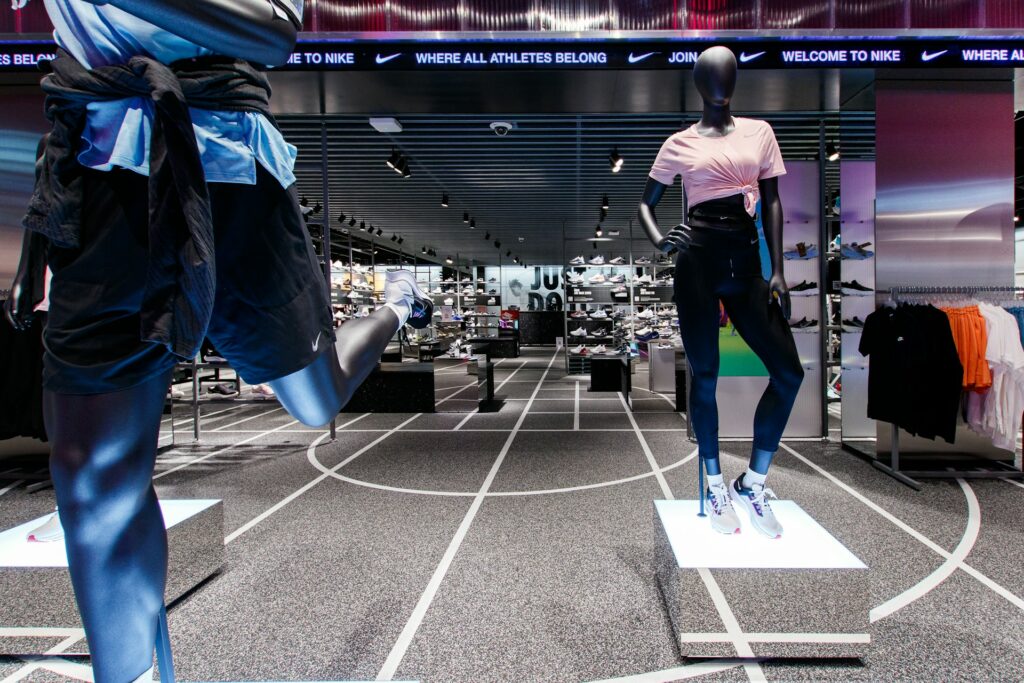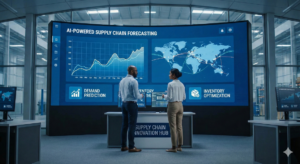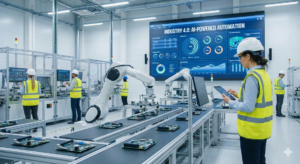Artificial Intelligence in the Retail Industry: From Virtual Shopping Assistants to Demand Forecasting

Artificial Intelligence in the Retail Industry: From Virtual Shopping Assistants to Demand Forecasting
Artificial intelligence is one of the main factors that is contributing to the fast change that is occurring in the retail industry. Artificial intelligence (AI) is transforming the way that retailers do business and consumers purchase. This transformation ranges from more intelligent management of supply chains to suggestions for products that are tailored to the individual consumer. Artificial intelligence is now being used in daily retail experiences, both in brick-and-mortar shops and on the internet, which means that the change is no longer just a theoretical possibility. This technology revolution is improving consumer happiness, lowering operational inefficiencies, and enabling firms to compete in a market that is becoming more and more dynamic.
1. The Evolution of Artificial Intelligence in Retail
Ever since the 1970s, when barcode scanners were first introduced, the retail industry has been profoundly influenced by technology breakthroughs. The development of e-commerce platforms in the 2000s is another example of this phenomenon. Artificial intelligence (AI) is the driving force behind the next significant revolution in business today, as it enables businesses to predict what consumers will need, automate the process of making decisions, and provide tailored experiences on a large scale. The transformation is not just about efficiency, but it is also about being relevant in a market where the demands of consumers are increasing at a fast pace.
2. Assistants Who Provide Virtual Shopping Services
The increasing popularity of virtual shopping assistants is among the most conspicuous uses of artificial intelligence in the retail industry. These instruments, which are powered by artificial intelligence, serve as personal advisers, assisting clients in locating items, comparing pricing, or obtaining answers to their concerns in real time. Virtual assistants, in contrast to static frequently asked questions (FAQ) sections, develop a more sophisticated understanding as a result of interactions and get wiser with each chat. They are used by retailers to provide round-the-clock service, to lower the rate of cart abandonment, and to boost consumer interaction.
3. Suggestions That Have Been Customized for You
Artificial intelligence (AI) is excellent at processing enormous amounts of data in order to detect trends in consumer behavior. Artificial intelligence systems are capable of providing consumers with product suggestions that are personalized for their individual needs by keeping records of their browsing history, the frequency with which they make purchases, and their demographic information. This method not only enhances the customer experience, but it also boosts revenue by recommending products that consumers are more likely to purchase. Personalized recommendation algorithms have become a fundamental aspect of current e-commerce systems.
4. Visual Search Powered by Artificial Intelligence
In today’s world, many people who buy things have a clear idea of what they are looking for, but often have difficulty expressing it in language. Customers are able to submit a picture and immediately obtain recommendations for goods that are comparable to it thanks to AI-powered visual search. For instance, snapping a picture of a friend’s shoes might result in the instant availability of alternatives for purchasing from internet merchants. This makes the process of buying less stressful and helps to close the gap between when someone feels inspired to buy something and when they actually make the purchase.
5. Demand Forecasting and Inventory Management
Retailers are faced with the never-ending task of trying to maintain a balance between the supply of goods and the demand for those goods. Overstocking results in money being tied up, whereas understocking results in missed revenues. Demand forecasting algorithms that are powered by artificial intelligence examine past sales data, industry trends, seasonal patterns, and even outside influences like as weather conditions or holidays. Retailers are able to make sure that items are in stock at the moment that consumers are interested in purchasing them, optimize their inventory, and minimize waste by using these forecasts.
6. Maximizing the Value of Pricing
Another area where artificial intelligence (AI) is essential is in the field of dynamic pricing. Systems using artificial intelligence (AI) are able to alter pricing in real-time in order to optimize profit while remaining competitive. This is accomplished by monitoring rival prices, variations in demand, and buying behavior. As an example, the price of a fashion item or an airline ticket might fluctuate many times over the course of a day, based on supply and demand. Retailers that make the decision to use pricing tactics guided by artificial intelligence gain a major advantage in marketplaces that are rapidly changing.
7. Security and Fraud Detection
Artificial intelligence (AI) is being utilized more and more often to identify anomalous purchasing habits and to flag fraudulent actions before they have the opportunity to inflict any harm. It is possible for machine learning algorithms to detect irregularities in transaction data that human analysts may not be able to identify. Retailers that adopt this proactive strategy are better equipped to defend themselves as well as their consumers, which in turn strengthens confidence in platforms for online purchasing.
8. Applications of Artificial Intelligence in Retail Stores
E-commerce is not the only use for artificial intelligence. In order to keep track of product availability, brick-and-mortar retail businesses are making use of technology such as smart shelves, cashier-less checkouts, and computer vision. There are even some stores that are experimenting with cameras that are driven by artificial intelligence (AI). These cameras monitor the movements of shoppers, which helps store management optimize layouts and enhance the entire shopping experience.
9. Using Chatbots to Improve Customer Experience
Artificial intelligence chatbots are now being used as front-line customer support personnel. Artificial intelligence chatbots are capable of processing routine inquiries promptly and effectively, which sets them apart from conventional contact centers that depend primarily on human workers. They are capable of providing order updates, recommending related goods, or walking users through the procedures for returning items, which frees up human employees to concentrate on client interactions that are more complicated or of more value.
10. Reducing Waste and Promoting Sustainability
In the retail industry, sustainability has emerged as a significant goal, and artificial intelligence (AI) is also playing a part in this. Overproduction may be reduced by making use of more intelligent demand forecasts, and artificial intelligence (AI)-driven logistics can improve delivery routes, which will in turn decrease fuel usage. Some vendors are going so far as to use artificial intelligence (AI) in order to suggest items that are ecologically friendly to customers who are concerned about their impact on the environment, therefore matching the objectives of their company with their principles about sustainability.
11. Ethical dilemmas and obstacles that arise
Artificial intelligence in retail offers several advantages, but it also presents a number of obstacles. It is possible that relying too much on data may result in algorithmic bias, which is a situation in which certain groups of customers are presented with fewer options or unjust pricing. Because retail businesses gather huge quantities of personal information, data privacy is yet another issue that is of immediate importance. Success in the long run will depend on striking a balance between customization and ethical responsibility.
12. The Future of Artificial Intelligence in Retail
In the future, artificial intelligence (AI) is expected to continue to develop and to be incorporated into ever more immersive shopping experiences. In the near future, we will see the emergence of augmented reality fitting rooms, fashion trends curated by artificial intelligence, and customer service that anticipates the needs of the client. The retail industry may undergo a transformation into a completely customized ecosystem as these technologies progress and mature. In such a system, the trip of each consumer would be unique, and artificial intelligence would dynamically create these experiences.
Artificial intelligence (AI) is no longer a notion that belongs to the future of retail; it is now an established component of the shopping experience. Artificial intelligence is making businesses more efficient and improving customization. This is being accomplished via a variety of means, ranging from virtual assistants who walk clients through the process of making purchases to predictive models that guarantee that shelves are always supplied. The advantages of incorporating artificial intelligence (AI) into retail are indisputable, despite the fact that there are still obstacles, such as algorithmic fairness and data privacy, that need to be addressed. For companies, adopting artificial intelligence (AI) is more than just a way to remain competitive; it is an opportunity to reimagine the shopping experience for a whole new generation of customers.




